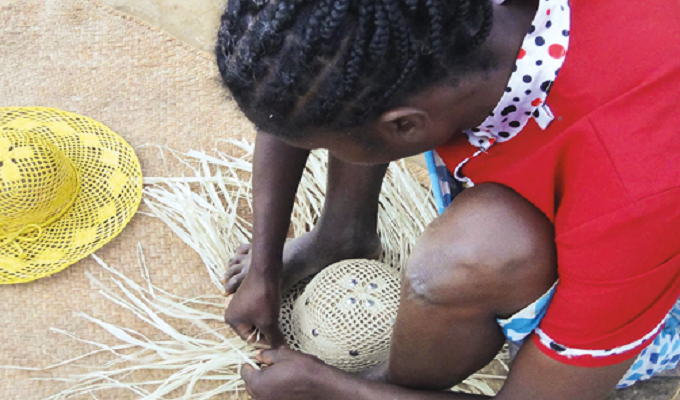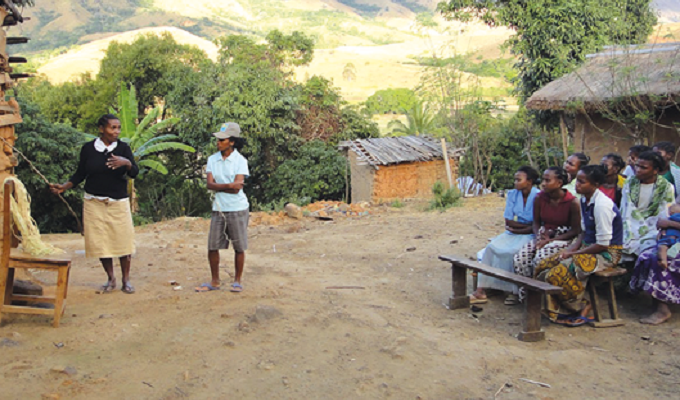

Empowering women in Madagascar through climate-smart raffia production
In developing countries, widespread rural poverty can sit uneasily with the protection of biodiversity. While many people rely on natural resources to meet subsistence needs, others see greater economic gain, at least in the near term, in destroying fragile habitats, whether for agricultural or industrial use. It is possible to reconcile urgent livelihood needs with sustainable stewardship of local plant and animal species by linking economic opportunities to biodiversity protection. Doing so can even help communities better adapt to climate change. However, it requires the right incentives and support structures.
Madagascar’s forests are biodiversity hotspots, home to species found nowhere else. At the same time, the country faces serious development challenges. Its unique forest habitats are threatened by slash and burn agriculture and illegal logging, exacerbating the already visible fallout from changing temperature and rainfall patterns.
Fibres from raffia palms have long been used for making traditional handicrafts, twine, rope, and clothing. More recently, woven hats and bags made from raffia have started to find favour in the international fashion industry.
But this has not translated into a payoff for the women’s cooperatives that typically process raffia and sell it on to traders: raffia yields have been battered by deforestation and climate change.
‘I think that due to climate change, there is less raffia in the area,’ said Florine Zafijery, a member of a women’s association producing raffia around the Makira National Park in north-eastern Madagascar. ‘In the past raffia could live up to 50 years. Now, it lasts only 20 years.’
ITC is working with the Wildlife Conservation Society (WCS) to build climate resilience, improve sustainability practices, and raise incomes in communities reliant on Raffia a for their livelihoods.
In the face of declining yields, the women’s associations must improve harvesting practices and upgrade processing and quality to meet the exacting standards of international buyers. To maximize the prices they receive, associations need to complement increased productivity with improved product design and direct sales (cutting out middlemen) to international buyers.
In areas surrounding the WCS-managed Makira National Park, ITC is training women’s associations on climate change adaptation, climate-smart raffia harvesting and processing techniques, and organizational management. By increasing incomes for households near Makira Park, one of the country’s largest remaining mid-elevation tropical forests, the project aims to reduce dependence on unsustainable exploitation of natural resources, and engage local communities as collaborative managers in the 372,000-hectare park’s conservation activities
‘Local people used to exploit the forest for a living. When we encouraged them to preserve the forest, we had to present them with another source of income,’ said Julie Félixine, a WCS trainer. ‘Promoting the raffia value chain ensures that the local population has an income-generating activity and prevents the forests from being exploited.’
The resultsIn 2015, ITC and WCS conducted training workshops for around 200 women from six women’s associations in the Makira area. Subjects included raffia harvesting, sorting, drying, tanning, quality improvements, and reforestation. The goal was to ensure climate awareness and resilience alongside long-term profitability.
This capacity building was implemented in two stages. First, four women from each association – 24 in total – received training to equip them to train their fellow association members in the long run. Next, training workshops were held in multiple villages for some 180 women from the six associations. ‘During the training, we learned a lot about raffia and we are now crafting better-quality items,’ said Florine Zafijery, one of the producers.
Zafijery and her colleagues are how harvesting raffia more sustainably, having learned not to harvest leaves yet to reach a certain minimum length. They are also refraining from harvesting the edible fruit that sprouts from the terminal buds of raf a palms, since doing so prevents subsequent branch growth and ultimately causes palms to die prematurely. Instead, fruits will only be harvested from palms that have reached the maximum age, and used primarily for reforestation. By allowing the palms to live longer, these improved practices conserve the habitat of many local plant and animal species, including lemurs and the carnivorous cat-like fossa, which is endemic to Madagascar.
In addition, the women are now able to produce more sophisticated raffia products, such as bags and hats, positioning them to target higher-value export markets.
The futureIn 2016, the project’s training activities will expand to cover eight additional women’s associations in the Makira Park area, bringing the total number of beneficiaries to 450. Furthermore, two women from each of the participating associations will receive intensive training on product design and manufacture for the international market, enabling them in turn to train their peers, with the goal of better equipping the associations to sell value-added products.
ITC will build on its market-connecting work to create a network of potential raffia buyers, and, together with WCS, will help the associations legally organize into one cooperative so they can more easily strike contracts with international buyers.



